Consultants experts:
Dr. Park Jong Woon - Korea Institute for Animal Products Quality Evaluation - Seoul Branch Office Expert.
Dr. Youngkyoon Oh, KOICA Project Manager, Vietnam - Korea Livestock Training Research Institute
Participants:
Lecturers of the Faculty of Animal science: Dr. Bui Huy Doanh, MSc. Vu Thi Ngan;
All members of the research group “Preservation and processing of products of animal origin”, lecturers and researchers in the Faculty of Food science and technology.
At the beginning of the consultation session, Dr. Bui Huy Doanh briefly introduce KOICA project and opportunities for cooperation in building a centre for assessing the quality of livestock products.
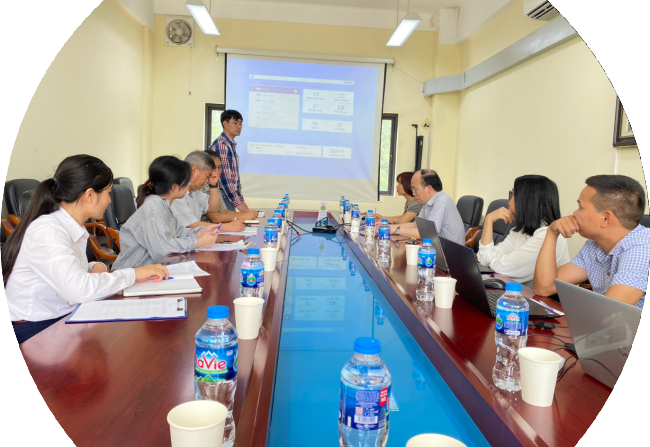
Dr. Bui Huy Doanh introduces Koica project with OD5.4 component
Dr. Park Jong Woon share the "Livestock products grading system". In Korea, the livestock product grading system is managed by the Korea Institute for Animal Products Quality Evaluation (KAPE). KAPE is the government agency responsible for the assessment and certification of animal products, including meat, eggs and dairy products. The classification system of livestock products in Korea is based on a combination of visual assessment and scientific measurement of various quality indicators. The grading process considers factors such as meat colour, fat content, veining and texture.
For beef, the Korean grading system is divided into four grades: 1++, 1+, 1 and 2. The highest grade, 1++, is for beef with marble, tenderness, and special flavour. Grade 2 beef is lower quality, less marble, and more tender.
For pork, the grading system in Korea is divided into three grades: 1++, 1+ and 1. The highest grade, 1++, is reserved for pork with marble, colour and special firmness. Grade 1 pork is inferior quality, with less marble and firmness.
Eggs in Korea are classified based on their weight, color and shape. Grade A of eggs is the highest quality, uniform in shape, colour, and size.
The livestock product grading system in Korea is very important to ensure stable quality and safety for consumers. Highest-grade products are often sold at a premium in the market.
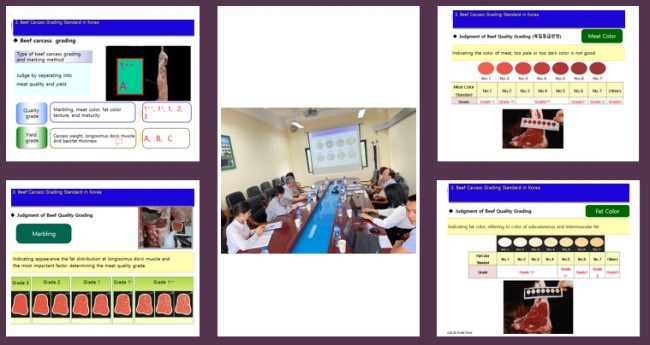
Dr. Park Jong Woon shared about “Livestock products grading system” in Korea
Next, Dr. Nguyen Thi Thanh Thuy introduce the situation of teaching and research on quality assessment of livestock products in Vietnam and the Vietnam National University of Agriculture. The quality of livestock products in Vietnam is managed by state agencies, organizations and businesses related to the production and consumption of livestock products. Besides, there are still many difficulties and challenges related to legal documents, livestock production, slaughtering, sale, etc.; the capacity of the staff to do the quality assessment, equipment; consumer awareness.
However, Vietnam is making efforts to promote the management and assessment of livestock product quality by strengthening the product quality management system, stepping up the inspection and supervision of product quality, improve the capacity for management agencies and consumers to be able to evaluate and use safe and good quality products.
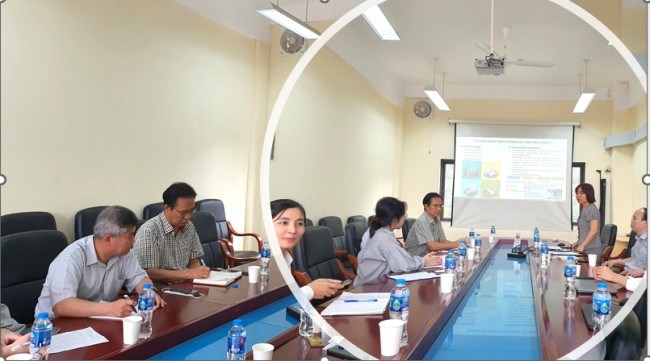
Dr. Nguyen Thi Thanh Thuy introduced the teaching and research on quality assessment of livestock products at VNUA
Finally, there are discussions and expert advice. Many questions were raised such as “Is the livestock product grading system applicable to meat that will be processed? Is the grading system useful for consumers in choosing products and does it affect the cost of livestock products? How to grade chicken and duck meat? How is the traceability of livestock products for small and medium-sized chicken and pig farms? Which equipment should be used in the laboratory?, etc.”. With the above questions, the experts discussed enthusiastically with the team members, solving the problems. Currently, in Korea, there is no grading system applicable to livestock products for processing. For the quality of beef from Korea, the US, Australia, and Canada, marble is an indispensable criterion. The difficulty in Vietnam is that there has not been a certain criterion to evaluate the quality of meat. The expert also consulted on the equipment used to assess the quality of meat in the laboratory, opening opportunities for cooperation, training and analysis for team members.
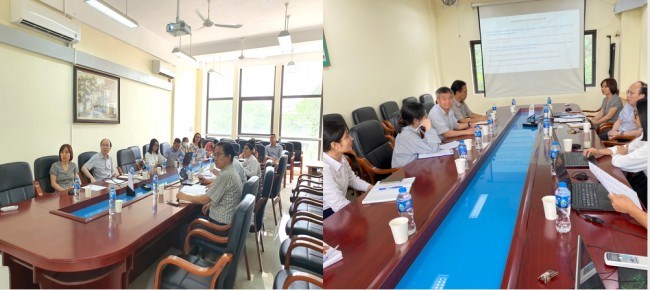
Experts give advice
At the end of the meeting, the representative of the research group, Dr. Nguyen Thi Thanh Thuy express gratitude to the consultants. The results of the meeting have brought research ideas to the attendees and there will be deeper cooperation in training and scientific research between Korean experts and the Vietnam National University of Agriculture in the field of evaluating the quality of livestock products.
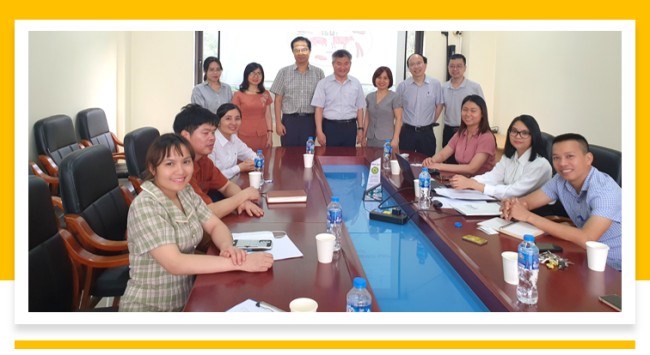
Souvenir photo of the consultants with the participants
Research Group Preservation and Processing of products of animal origin